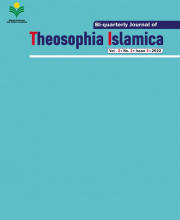
مقالات
حوزه های تخصصی:
This paper explores early and Reformation-era Christian attempts to render the idea of an afterlife coherent. The specific focus is on early Reformed Christians’ unequivocal belief in a bodily criterion of personal identity and a physical afterlife. This article shows how Jewish divisions are partially responsible for the differences from this endeavor. Lending focus and structure to this broadly reconstructive project is a sustained critique of Princeton philosopher Mark Johnston’s recent agenda-setting series of lectures published as Surviving Death. My general conclusion is that Christian resurrectionism—or at least, the most persuasive forms of it as presented by some of the more astute Reformed Christian thinkers—is at least a coherent idea regardless of whether or not it is true.
Immortality in the Aristotelian Christian Tradition
حوزه های تخصصی:
In Christian Aristotelianism and Thomism, immortality is not endless continuity in time after death but assimilation and participation in God’s eternity. Life of the Saved does not undergo changes per se since there is no passage of time in eternity. For Aquinas, the subjects of immortality are, on the one hand, the resurrected human beings and, on the other, the subsistent souls, which should not be confused with substances proper. Personal identity and thus the resurrected body's identity form substantial individuals . In Aristotelian hylomorphism presupposed by the two theses, the materia is not mattered in the modern sense, but rather potentiality.
Compatibility or Incompatibility of Bentham's Utilitarianism with the Quran's Doctrine
حوزه های تخصصی:
Moral utilitarianism is one of the most significant and common theories in normative ethics, which gained prominence with the utilitarian utterance of Bentham's crime, and different interpretations of it have always been presented with various modifications. Some Muslim thinkers, familiar with Bentham's theory of utilitarianism, have tried to make it compatible with Quranic teachings by adding a clause or constraint. In addition, they have considered Quranic verses to support Bentham's seven criteria. The basic objection of such thinkers to Bentham is that he has limited profit to pleasure only, and that is worldly pleasure, while from the point of view of religion, profit and pleasure are both worldly benefits, pleasures and include the pleasures of the Hereafter. The important point is that before we look for the verses that confirm Bentham's utilitarian theory and his seven criteria, we must see whether there is any possibility of a new interpretation of utilitarianism based on the verses of the Quran. Therefore, in this article, in addition to reviewing and criticizing this view, the impossibility of a new interpretation of utilitarianism based on the verses of the Quran is explained.
Should Christians or Muslims Be Dualists? A Critical Review of Two Articles
حوزه های تخصصی:
Charles Taliaferro’s “Philosophy of Mind and the Christian” begins with a loaded question: “Are we thoroughly physical beings, or do we contain some nonphysical part, something we may call a soul, spirit, or mind?” The question presents us with a false dilemma, for there is also the possibility that we are neither merely material beings nor do we contain a soul as a nonphysical part of us. Taliaferro follows this with a list of other questions pertaining to the philosophy of mind and asks whether Christians should give answers to these sorts of questions that differ from non-Christian colleagues. It seems odd to divide colleagues based on Christianity with regard to these questions, for it means that if the Christian colleagues do have a particular take on these issues, it will be different from that of non-Christian theistic colleagues. Perhaps, however, Taliaferro’s department consists only of Christians and atheists. In this case, however, Taliaferro seems to think that there will be a uniformity in Christian thought that seems somewhat doubtful.
Is the Human Death A Result of Adam's Sin? A Comparative Study of Quran and Bible on Death
حوزه های تخصصی:
The story of the Original Sin that is Adam and Eve and their sin of eating from the Forbidden Fruit is mentioned in the Bible as well as the Quran. . Although there are some similarities in the narration of this event in these holy books, there are some nuances in some significant points. One of the significant differences is the consequences of Adam's Original Sin in eating the Forbidden Fruit. Traditional narratives of the Bible emphasize human death as one of these consequences. This belief has been considered one of Christian theology's fundamental assumptions. However, there is no narrative in the Quran. This paper discusses that human physical death is not necessarily the result of Adam's Sin, as narrated in Torah. Instead, the spiritual death that is considered a result of human sin is the consequence of Adam's Original Sin, like other human sins. Despite some Christian interpretations that completely changed the story, this study shows that the Torah's statement is entirely interpretable and reasonable. In this respect, the Quran has never mentioned anything about Adam and his progeny's physical and spiritual death. Instead, the Quran states that merciful God forgave his fault in eating the Forbidden Fruit, and God will never punish people for the sins of others; thus, sin is not hereditary.
Swinburne, the Gift of Life, and the Soul
حوزه های تخصصی:
In his attempt, to make plausible the Christian doctrine of Atonement, Richard Swinburne faces many objections. One objection has been that no sense can be made of the belief that life is a gift. This is because humans have no responsibility to God and no subsequent need to atone to God for wrongdoing. One way out of this objection requires belief in a soul. This paper, based on descriptive analytics, outline Swinburne’s Atonement theory to give a flavor of what depends on the belief that life is a gift from God. Then categorize and present the objections Swinburne faces. As for the objection it will focus on, and also provide its remedy and suggest that the remedy is quite digestible from an Islamic perspective.